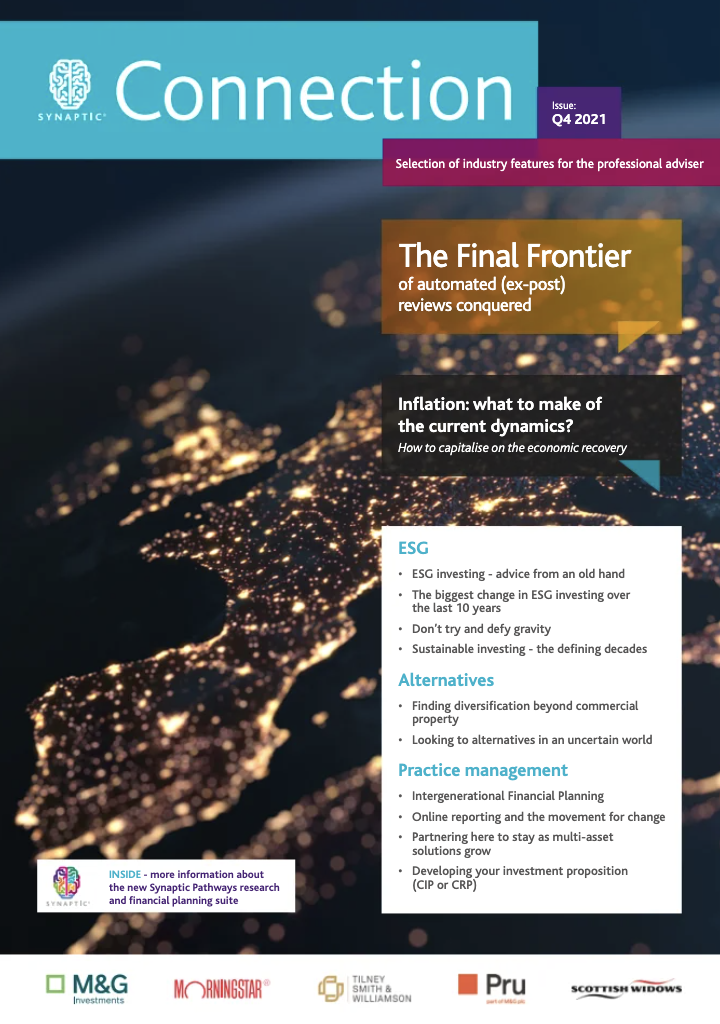In this edition...
- The final frontier of research and due diligence conquered Eric Armstrong, Client Director
- Hours to minutes Eric Armstrong, Client Director
- World Economic and Market Outlook Graham O’Neill, Senior Investment Consultant, RSM.
- Inflation – what to make of the current dynamics Maria Municchi, Fund Manager, Sustainable Multi Asset Fund Range M&G Investments
- Sustainable Investing – advice from an old hand Hugo Thompson, Multi-Asset Investment Specialist HSBC Asset Management
- The biggest changes in ESG investing over the last 10 years Mark Coles, Head of Nationals & Networks Tilney Smith & Williamson
- Don’t try and defy gravity Catriona McInally, Business Development Manager – Investments Prudential
- Sustainable investing – the defining decades Hamish Chamberlayne, Head of Global Sustainable Equities | Portfolio Manager Janus Henderson
- Finding diversification beyond commercial property Shayan Ratnasingam, Investment Manager Liontrust Multi-Asset team
- Looking to alternatives in an uncertain world Chris Forgan, Portfolio Manager Fidelity Multi Asset
- Developing your investment proposition (CIP or CRP) David A Norman (DAN), CEO, TCF Investment
- Intergenerational Financial Planning Gareth Davies, Pension Specialist, Scottish Widows
- Is your online client reporting up to scratch? Natalie Holt, Content Editor, The Lang Cat
- Partnering here to stay as multi-asset solutions grow Antony Champion, Head of Intermediaries, Brewin Dolphin
- How to Capitalise on the Economic Recovery, Including Morningstar’s Portfolio Positioning Leslie Alba, Associate Director, Research Morningstar Investment Management Europe
- Unemployment insurance is back Kesh Thukaram, Co-Founder Best Insurance
Sustainability has been the hot-button topic for investors over the past 18 months. In 2020 European sustainable mutual funds and ETFs saw record breaking flows – £200bn, representing 45% of the years flows1. At HSBC Asset Management we have always maintained that responsible investment is key to our management process and launched our first SRI fund in 2001. Over the past 20 years we have developed five tenants for success in this space.

"It's true, that some areas of the sustainable universe do appear to be overbought. That being said, there are significant investment opportunities with companies that might not be obvious beneficiaries of the transition or are in emerging industries where investors have yet to realise the sustainable potential."
1. Risk management is imperative
When the subject of sustainability is raised, there are some topics that always seem to come up: the market for solar power, the potential for biodiesel, and the demand for electric cars to name a few. All are interesting and valid topics, but they only represent one side of the investment equation: the opportunities for sustainable investment, while ignoring the other side: risks. Sustainable investors have a wide array of risks to manage, and doing so effectively can be the making, or breaking, of a successful ESG strategy. Extreme weather events causing physical asset damage, the transition to a net-zero economy resulting in stranded assets, carbon pricing, regulatory change, governance failures, gender equality, and monitoring supply chains for everything from modern slavery to conflict minerals. In short, considering the opportunities created by ESG simply isn't enough anymore, the really effective strategies are just as focused on what can go wrong as on the potential upside.
2. Sustainability or diversification? You no longer have to choose
There was a time when investing sustainably meant simply excluding oil, tobacco and gambling from portfolios, but this rightly raised concerns around lost portfolio diversification. We believe instead in using positive screening and active engagement to identify and support sustainability leaders, regardless of industry. This approach coheirs with the EU's net zero PAB initiative, which highlighted that sustainability issues like the transition to net zero can't be accomplished by climate focused corporations alone, and must instead involve a broad-based coalition of companies across every sector.
Furthermore, ESG investment is no longer confined only to equities; from the record issuance of green, social and sustainability bonds (Moody's projects $650bn in 2021), to the launch of Investment Grade and High Yield Bond Sustainability indices by Bloomberg Barclays and ESG Emerging Market Debt indices by J.P. Morgan, investors are now able to construction highly diversified sustainable multi asset portfolios, built for clients of various risk tolerances and long-term goals.
3. Sustainable investment is here to stay, but some assets might be overbought
With a glut of ESG fund launches and some £1 billion a month flowing into responsible investing funds in 20202, it's no wonder there are concerns about stretched valuations. Coupled with concerns that sustainable investing means sacrificing returns, with some 64% of respondents in our survey believed investing this way means losing out financially3.
It's true, that some areas of the sustainable universe do appear to be overbought. That being said, there are significant investment opportunities with companies that might not be obvious beneficiaries of the transition or are in emerging industries where investors have yet to realise the sustainable potential. This is why a strong research capability and dynamic approach is key to future success – by adopting a valuation-based investment approach we can avoid falling foul of bubbles; buying when markets are looking cheap and selling into strong investor demand.
4. Integration is simply the first step
Incorporating sustainability considerations into the investment decision making process (commonly known as ESG integration) is the first step in creating a sustainable investment strategy, however it is far from the only requirement. Of equal importance is a consistent, co-ordinated, and compelling engagement agenda focused on strategic discussions with the senior management of investee companies. Such discussions should be co-ordinated with voting decisions, which can serve as an effective tool to escalate concerns when other engagement has proved ineffective.
5. Investing sustainably is difficult and requires specialist skill
While sustainable investing is very much in vogue, it requires a different investment framework from traditional portfolios. This is due to the lack of a standard taxonomy, inconsistent data sources, and inadequate transparency/engagement on the topic with some market participants.
Tackling these complexities requires an investment manager to hold three attributes: first a dedicated team with a specialist set of skills as comprehensive analysis of the sustainability characteristics of investments across fixed income, equity and alternative asset classes is vital. Second, an advocacy program focused around improved industry standards and transparency. And third, comprehensive reporting to assuage concerns of greenwashing. Such reporting should clearly articulate the details of the sustainable investment strategy and include an account of engagement activities: voting record, detailed case studies of recent and ongoing engagement projects, and descriptions of tangible consequences of the above on corporate performance.
The following strategies are risk-rated by Synaptic
- HSBC Global Sustainable Multi-Asset Cautious Portfolio.
- HSBC Global Sustainable Multi-Asset Conservative Portfolio.
- HSBC Global Sustainable Multi-Asset Balanced Portfolio.
- HSBC Global Sustainable Multi-Asset Dynamic Portfolio.
- HSBC Global Sustainable Multi-Asset Adventurous Portfolio.
www.assetmanagement.hsbc.com/uk
- Morningstar: https://www.morningstar.co.uk/uk/news/209411/sustainable-funds-record-breaking-year.aspx
- Figures from the Investment Association https://www.theia.org/media/press-releases/responsible-investment-funds-under-management-66-over-12-months
- Data is taken from a survey conducted by Core Data Research between January – February 2021 with 250 investors in four locations: Hong Kong, mainland China, Singapore and United Kingdom - (120 with net investable assets up to USD250-500k, 80 with USD500k - 1million and 50 with USD1m+) as well as 400 advisers (100 in each location) with average assets under advice of between USD100 million and USD500 million.
For journalists only and should not be distributed to or relied upon by any other persons.
Approved for issue in the UK by HSBC Global Asset Management (UK) Limited, who are authorised and regulated by the Financial Conduct Authority.
Copyright © HSBC Global Asset Management (UK) Limited 2021. All rights reserved.
Note to investors:
The information contained in this press release does not constitute an offer or solicitation for, or advice that you should enter into, the purchase or sale of any security or fund. Any views expressed are subject to change at any time.
This document is not intended for distribution to or use by any person or entity in any jurisdiction or country where such distribution or use would be contrary to law or regulation. This document is not and should not be construed as an offer to sell or the solicitation of an offer to purchase or subscribe to any investment.
Any views expressed were held at the time of preparation and are subject to change without notice. While any forecast, projection or target where provided is indicative only and not guaranteed in any way. HSBC Global Asset Management (UK) Limited accepts no liability for any failure to meet such forecast, projection or target. The value of investments and any income from them can go down as well as up and investors may not get back the amount originally invested. Where overseas investments are held the rate of currency exchange may also cause the value of such investments to fluctuate. Investments in emerging markets are by their nature higher risk and potentially more volatile than those inherent in some established markets.
HSBC Asset Management
HSBC Asset Management, the investment management business of the HSBC Group, invests on behalf of HSBC’s worldwide customer base of retail and private clients, intermediaries, corporates and institutions through both segregated accounts and pooled funds. HSBC Asset Management connects HSBC’s clients with investment opportunities around the world through an international network of offices in 25 countries and territories, delivering global capabilities with local market insight. As at 31 March 2021, HSBC Asset Management managed assets totaling US$621bn on behalf of its clients. For more information, see www.assetmanagement.hsbc.com/uk
HSBC Asset Management is the brand name for the asset management business of HSBC Group, which includes the investment activities provided through our local regulated entity, HSBC Global Asset Management (UK) Limited.
The HSBC Group
HSBC Holdings plc
HSBC Holdings plc, the parent company of HSBC, is headquartered in London. HSBC serves customers worldwide from offices in 64 countries and territories in its geographical regions: Europe, Asia, North America, Latin America, and Middle East and North Africa. With assets of $2,959bn at 31 March 2021, HSBC is one of the world’s largest banking and financial services organisations.
Sign up for updates
Keep up to speed with everything you need to know each quarter, by email or post.


